In the aftermath of the wide swath of devastation from the flooding in Central Europe, the fundamental role of climate change in both its origin and ultimate severity is being hotly debated by governments and scientists alike. The event, considered by some as being a once-in-a-millennium flood (12) has deluged extensive regions in western Europe. As of Monday 19 July, the death toll in Germany had reached 196 with a further 749 reported injured (30). A further 31 fatalities were reported in Belgium (30). Between 12-15 July, a low pressure system stalled across Europe bringing excessive rainfall in a short period to a number of countries including Germany, Luxembourg, France, Switzerland, Belgium, Netherlands and Austria.
Climate change
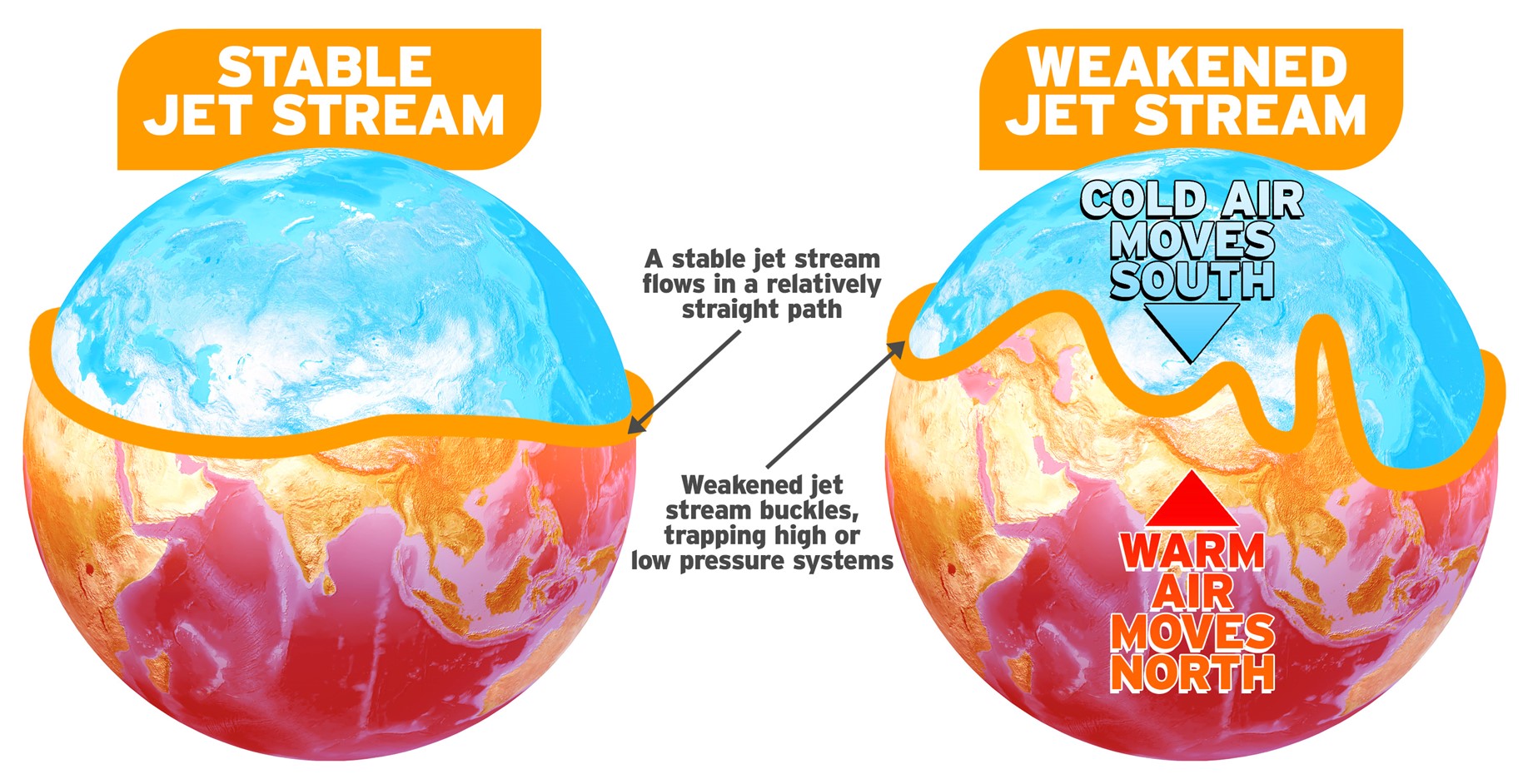 The topic of climate change and extreme rainfall has been brought up multiple times in various articles and news sources, and in statements from officials. While it takes time to conclude if any specific weather event is linked to climate change definitively, the further warming of the atmosphere is lessening the contrast between Polar regions and the Equator. The consequence of this can cause a weakening of the northern hemisphere jet streams, which subsequently buckle and become more prone to trapping large high or low pressure systems in place for many days or weeks at a time. This is being cited as the primary cause of the flooding in Europe last week. Similar effects of the weaker jet stream are linked to extreme weather events in Asia and North America, such as the extreme temperatures recorded earlier in the month in Canada. Whereas trapped high pressure regions bring drought and extreme temperatures, low pressure areas bring persistent high rainfall. (32).
The topic of climate change and extreme rainfall has been brought up multiple times in various articles and news sources, and in statements from officials. While it takes time to conclude if any specific weather event is linked to climate change definitively, the further warming of the atmosphere is lessening the contrast between Polar regions and the Equator. The consequence of this can cause a weakening of the northern hemisphere jet streams, which subsequently buckle and become more prone to trapping large high or low pressure systems in place for many days or weeks at a time. This is being cited as the primary cause of the flooding in Europe last week. Similar effects of the weaker jet stream are linked to extreme weather events in Asia and North America, such as the extreme temperatures recorded earlier in the month in Canada. Whereas trapped high pressure regions bring drought and extreme temperatures, low pressure areas bring persistent high rainfall. (32).
Rainfall
In Jalhay (Belgium), 272mm of rain fell in 48 hours as small streams and rivers were inundated (15). An additional consequence of a warming climate is the increased evaporation and relative water content of the air – a factor that further intensified the level of rainfall witnessed across Europe last week (15). For every 1 degree Celsius that the temperature increases, the air can hold 7% more moisture (15).
The highest daily rainfall occurred at Köln Stammheim station which saw 154mm of rain fall within 24 hours - a figure that is almost 50% higher than its previous daily record of 95mm (31).
Areas Affected
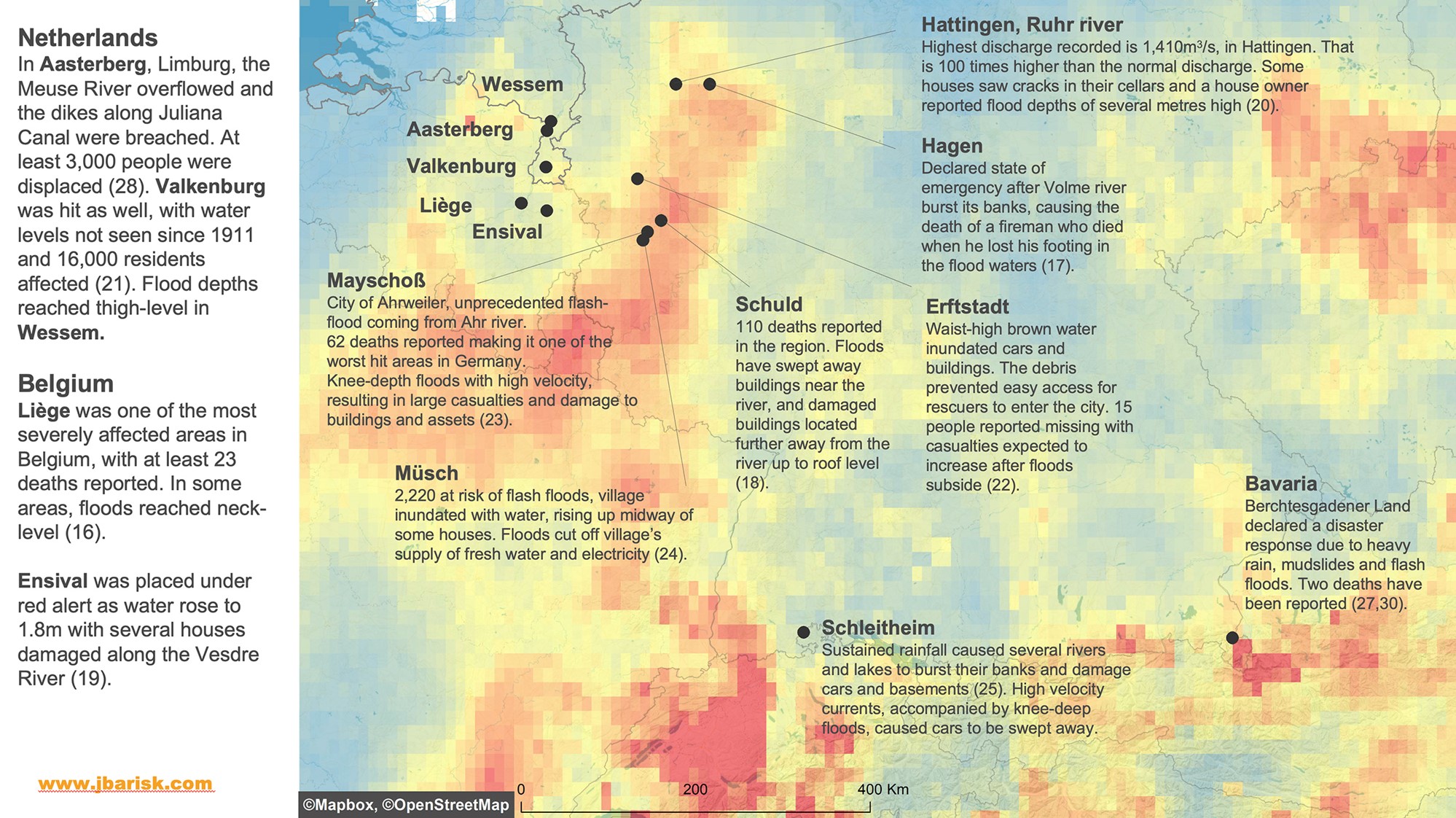 Figure 1: Rainfall accumulation from 11 to 18 July 2021; the highest rainfall is represented by red with a maximum of 210mm over the 7-day period. (Data source: NASA PPM. 2019. NASA Precipitation Measurement Missions. [online] Available at: https://pmm.nasa.gov/data-access/pps-ftp#jsimpson-NRTPUB/imerg/gis/late [Accessed 19 Jul. 2021].)
Figure 1: Rainfall accumulation from 11 to 18 July 2021; the highest rainfall is represented by red with a maximum of 210mm over the 7-day period. (Data source: NASA PPM. 2019. NASA Precipitation Measurement Missions. [online] Available at: https://pmm.nasa.gov/data-access/pps-ftp#jsimpson-NRTPUB/imerg/gis/late [Accessed 19 Jul. 2021].)
Germany’s Ahrweiler district has been one of the worst affected areas as flash floods surged through the village of Schuld, washing away six houses and leaving several more on the verge of collapse (4). In Ahrweiler district, water reached a record level of almost 3 metres (15). At least 90 of the reported deaths in Germany have been people living in towns and villages located in the valley by the Ahr River in Rhineland-Palatinate state (12). The river Ahr is a tributary of the Rhine, and 20 out of the 35 bridges along the Ahr were destroyed (30). The German Finance Minister estimates the destroyed infrastructure (roads and bridges) will cost billions to be rebuilt (29).
Aside from Germany, a number of other countries have been impacted. Liège, the third largest city in Belgium was flooded, with at least 23 confirmed to have died. The flooding in Liège resulted from high water levels along the Muese River (16). Lake Lucerne in Switzerland experienced flooding as well. Based on analysis by JBA Risk Management of the daily river gauge records across Switzerland, various sites (Table 1 and Table 2) suggest flow levels of up to 300 years may have been exceeded. Limburg, a southern province in the Netherlands, was the worst affected with thousands of people evacuated and businesses forced to close.
Rainfall distribution from 11 to 18 July 2021
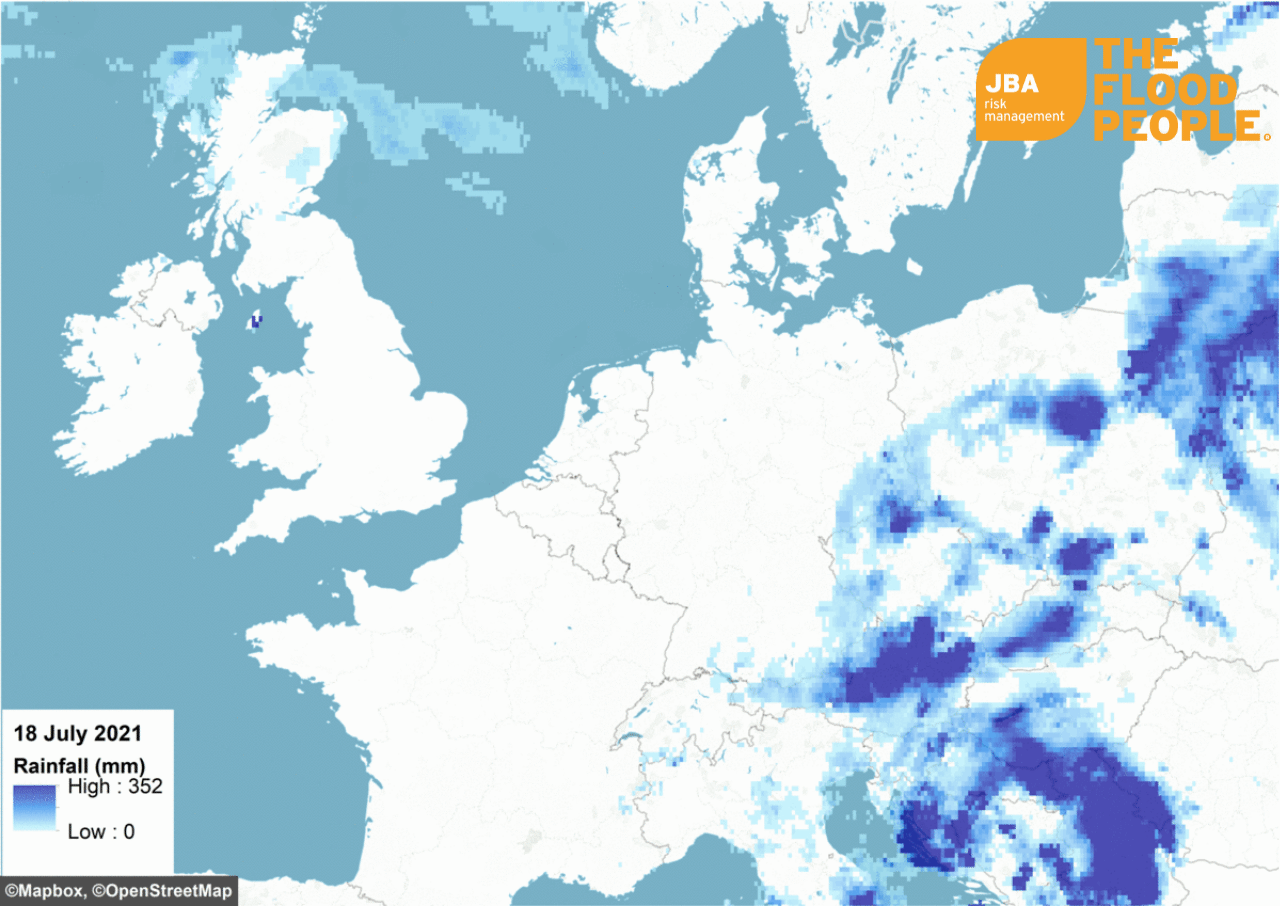 Figure 2: Video showing daily rainfall between 11 and 18 July 2021. (Data source: NASA PPM, 2021; video produced by JBA Risk Management Limited™.)
Figure 2: Video showing daily rainfall between 11 and 18 July 2021. (Data source: NASA PPM, 2021; video produced by JBA Risk Management Limited™.)
River Gauge Data
 Table 1: Maximum river height recorded for several gauge stations in Germany; level 3 suggests that large-scale built-up areas can be inundated. There may be a need to engage fire brigade and disaster control services on a large scale. (Source: Länder Ubergreifendes Hochwasser-portal, https://hochwasserzentralen.de/ [accessed on 19 July 2021].)
Table 1: Maximum river height recorded for several gauge stations in Germany; level 3 suggests that large-scale built-up areas can be inundated. There may be a need to engage fire brigade and disaster control services on a large scale. (Source: Länder Ubergreifendes Hochwasser-portal, https://hochwasserzentralen.de/ [accessed on 19 July 2021].)
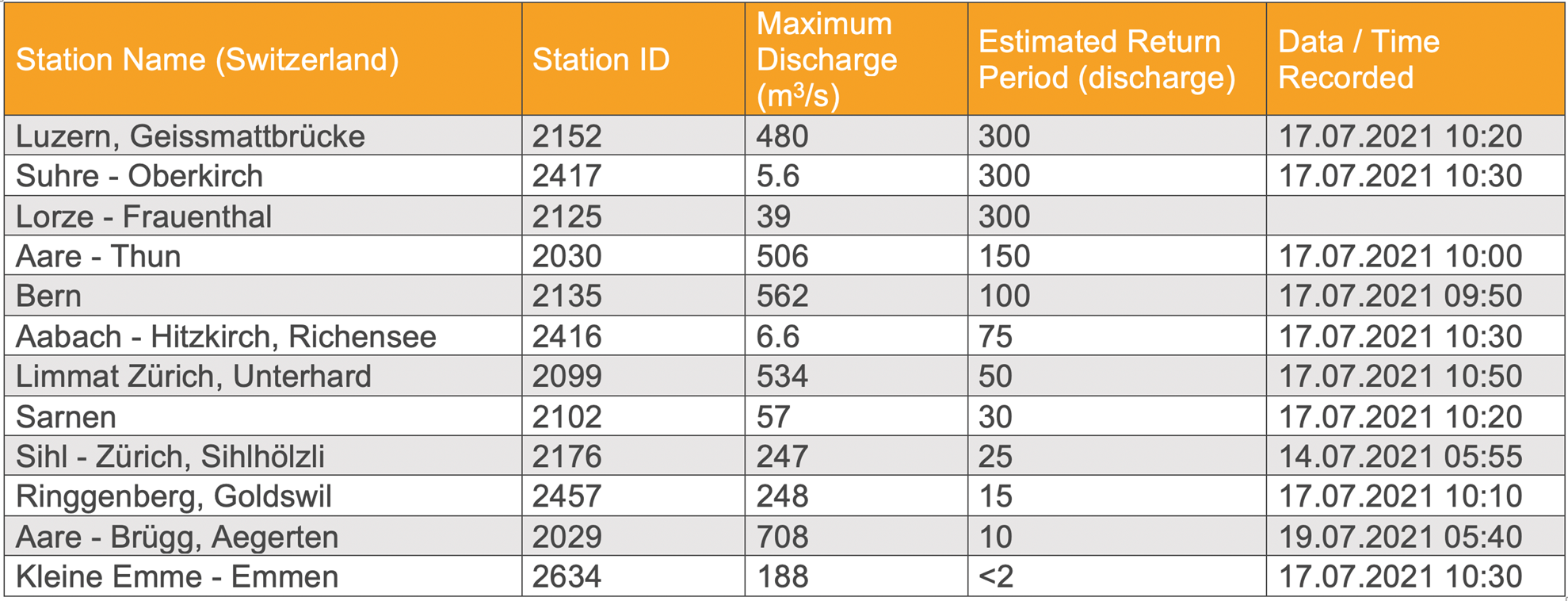 Table 2: Maximum river discharge recorded at some river gauge stations in Switzerland; the estimated return periods are based on return period analysis conducted at each gauge station based on historical records by FOEN. (Source: Hydrological data and forecasts from the Switzerland Federal Office for the Environment (FOEN).)
Table 2: Maximum river discharge recorded at some river gauge stations in Switzerland; the estimated return periods are based on return period analysis conducted at each gauge station based on historical records by FOEN. (Source: Hydrological data and forecasts from the Switzerland Federal Office for the Environment (FOEN).)
Notable Historic Events
Summer flooding in Central and Western Europe is not a new phenomenon and this latest event will draw immediate parallels to the devastating floods of 2002 and 2013. Those events resulted in economic losses of between $13 and $16 billion USD respectively (Table 3). Given insurance penetration is relatively high among Central European nations, insured losses for the same historic events were estimated to have cost the industry around $3.4 and $3.9 billion USD for the 2002 and 2013 floods respectively.
Aside from the similarities between the 2021 floods and those recent historic events, Figures 1 and 2 highlight that a noticeable difference in these latest floods is that the spatial footprint of rainfall and damage has been more concentrated in Northern European states and upon the smaller river networks and tributaries. The 2002 and 2013 floods were focused around the Danube and Elbe.
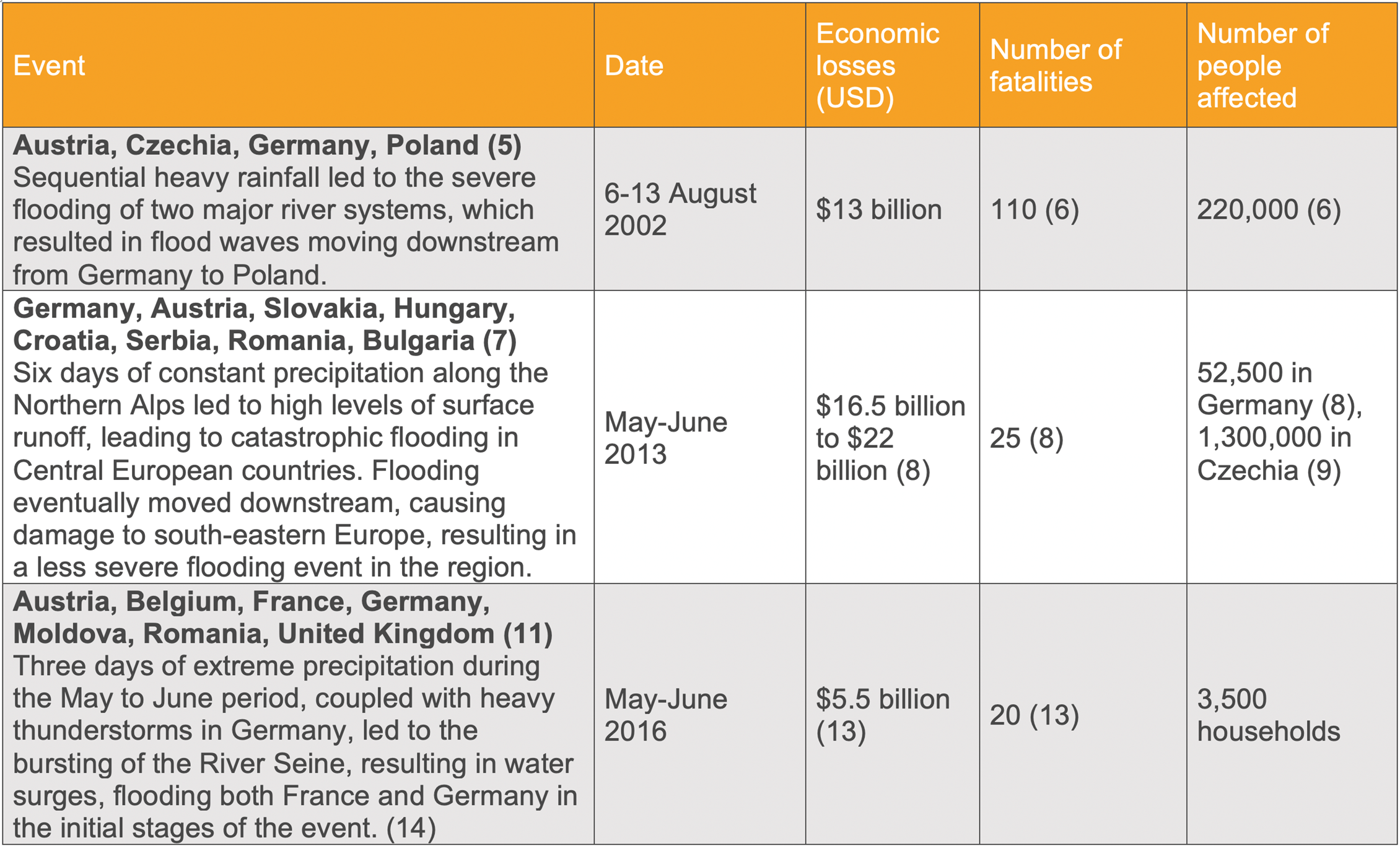 Table 3: Historic flood events across Central Europe.
Table 3: Historic flood events across Central Europe.
Average annual cost of flooding and JBA’s Europe flood modelling
Between 1980 and 2020, the economic average annual loss (AAL) due to flooding in Europe is estimated to be 12 billion EUR (33). The European Environment Agency highlights that this cost has progressively increased in successive decades; between 1980-1989 it was 6.6 billion EUR but from 2010-2019 it had grown to 12.5 billion EUR.
Based on a recent report published by JBA Risk Management and the World Bank Group (Financial Risk and Opportunities to Build Resilience in Europe), JBA modelled European flood risk under both a present and future climate. The findings of that work estimated that the average annual cost of flooding could increase by up to 25% and 21% for countries such as Germany and France by the middle of this century (33).
Given this rising hazard, made clear by the impacts of this flood event, it's vital that organisations begin to understand, assess and mitigate the risk, from continued investment in mitigation strategies like flood defences, to developing disaster finance mechanisms, to safeguard future communities.
JBA's Event Response team has produced a flood footprint for the event estimating fluvial flood extents and depths for Germany, Belgium and the Netherlands. Email the team at EventResponse@jbarisk.com for more information.
If you like to find out more about our 5m flood mapping and probabilistic flood modelling for Europe, please get in touch.
This report is covered by JBA’s website terms – please read them here.
References
- https://edition.cnn.com/2021/07/15/europe/germany-deaths-severe-flooding-intl/index.html
- https://www.bbc.com/news/world-europe-57846200
- https://www.bbc.com/news/world-europe-57850504
- https://www.nytimes.com/2021/07/15/world/europe/flooding-germany-belgium-switzerland-netherlands.html
- Socher M, 2008. Central European Floods 2002: Lessons Learned in Saxony
- https://forms2.rms.com/rs/729-DJX-565/images/fl_2002_central_europe_flooding.pdf
- https://www.icpdr.org/main/sites/default/files/nodes/documents/icpdr_floods-report-web_0.pdf
- Risk Nexus, 2013. Central European Floods 2013: a retrospective
- https://reliefweb.int/report/czech-republic/czech-republic-floods-dref-operation-n%C2%B0-mdrcz002
- Switzerland Fedral Office for the Environment (FOEN) https://www.hydrodaten.admin.ch/en/messstationen_gefahren.html
- http://www.markvoganweather.com/2016/06/09/2016-european-floods/
- https://www.nytimes.com/2021/07/17/world/europe/germany-floods-climate-change.html
- 2016 Annual Global Climate and Catastrophe Report
- https://www.worldweatherattribution.org/european-rainstorms-may-2016/
- https://www.nytimes.com/live/2021/07/16/world/europe-flooding-germany
- https://www.euronews.com/2021/07/16/liege-bracing-for-a-higher-death-toll-as-rescue-efforts-continue
- https://www.reuters.com/world/europe/one-dead-hundreds-evacuated-german-freak-floods-2021-07-14/
- https://www.dw.com/en/dw-reports-on-flooding-in-schuld-germany/av-58304777
- https://www.insider.com/floods-belgium-heavy-rain-wreaks-havoc-2021-7
- https://www1.wdr.de/nachrichten/ruhrgebiet/ruhrpegel-auf-jahunderthoechststand-100.html
- https://www.nytimes.com/2021/07/16/world/europe/netherlands-dike-flood.html
- https://www.theguardian.com/world/2021/jul/16/all-wrecked-german-town-stunned-flood-damage
- https://www.washingtonpost.com/world/europe/germany-floods-scene-destruction/2021/07/16/3129dd1c-e5a1-11eb-88c5-4fd6382c47cb_story.html
- https://www.hebergementwebs.com/europe/flood-damage-in-germany-leaves-village-without-electricity-or-running-water
- https://www.nytimes.com/live/2021/07/16/world/europe-flooding-germany
- Severe floods cause devastation in Europe: flash flood in Schleitheim Switzerland. Retrieved from : https://www.youtube.com/watch?v=smKZaw2ZC4I
- https://www.bbc.com/news/world-europe-57880729
- https://www.dutchnews.nl/news/2021/07/sirens-warn-as-dyke-is-breached-in-limburg-flooding-widespread/
- https://www.dw.com/en/germany-floods-rescue-efforts-ramp-up-as-destruction-spreads-to-new-areas/a-58303839
- https://www.nbcnews.com/news/world/almost-200-dead-many-still-missing-after-floods-germany-counts-n1274330
- https://www.theguardian.com/environment/2021/jul/16/climate-scientists-shocked-by-scale-of-floods-in-germany
- https://www.bloomberg.com/news/features/2021-07-16/photos-germany-s-record-flooding-show-devastation
- https://openknowledge.worldbank.org/handle/10986/35685
